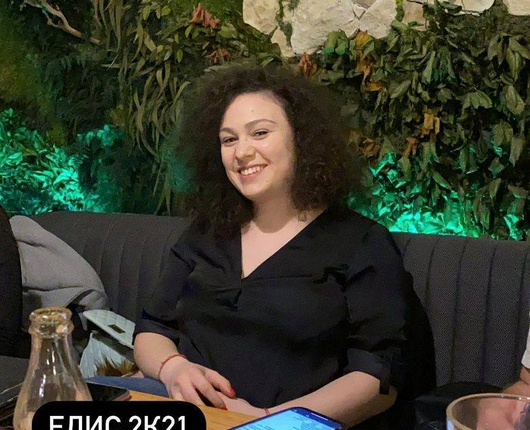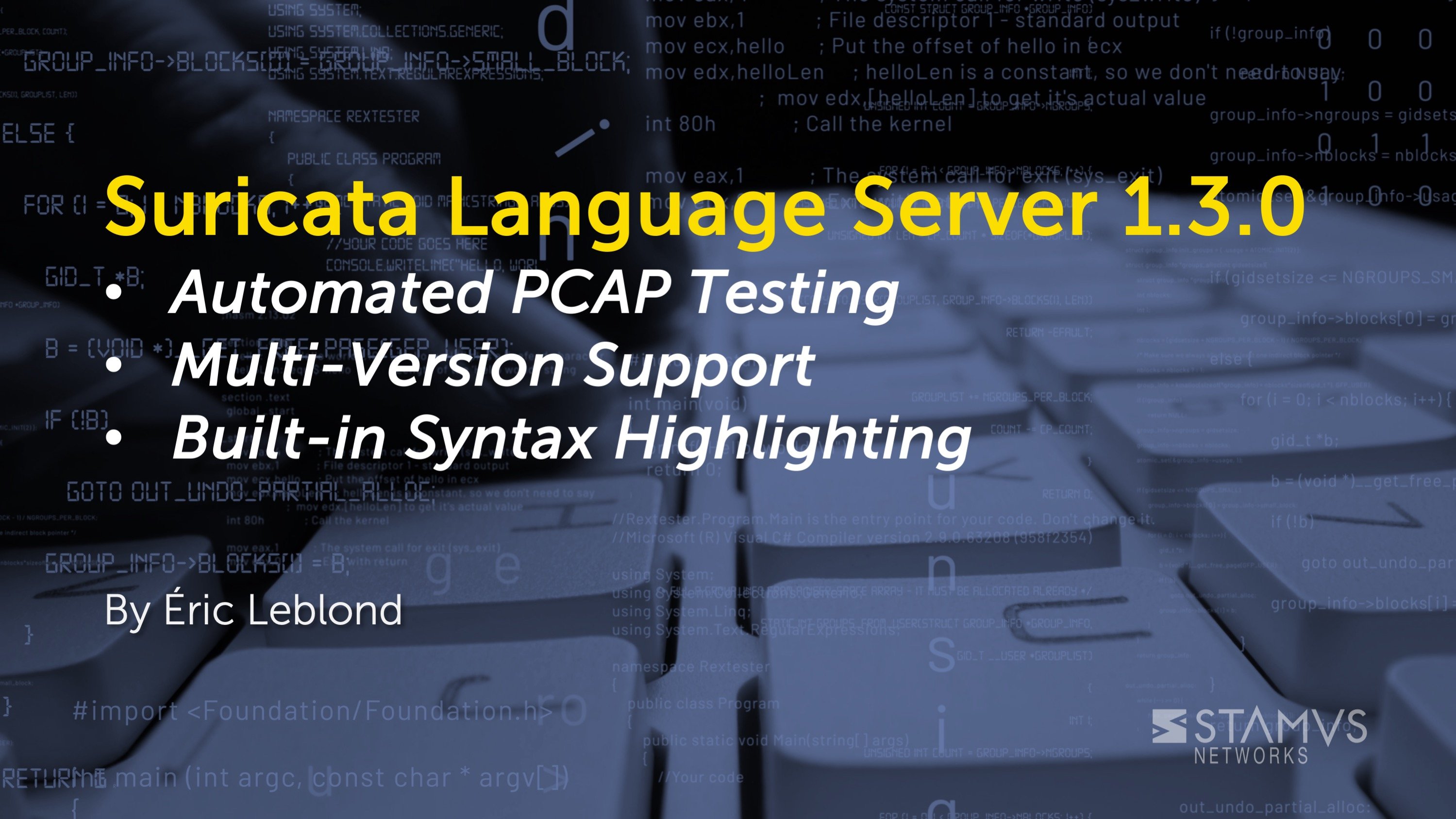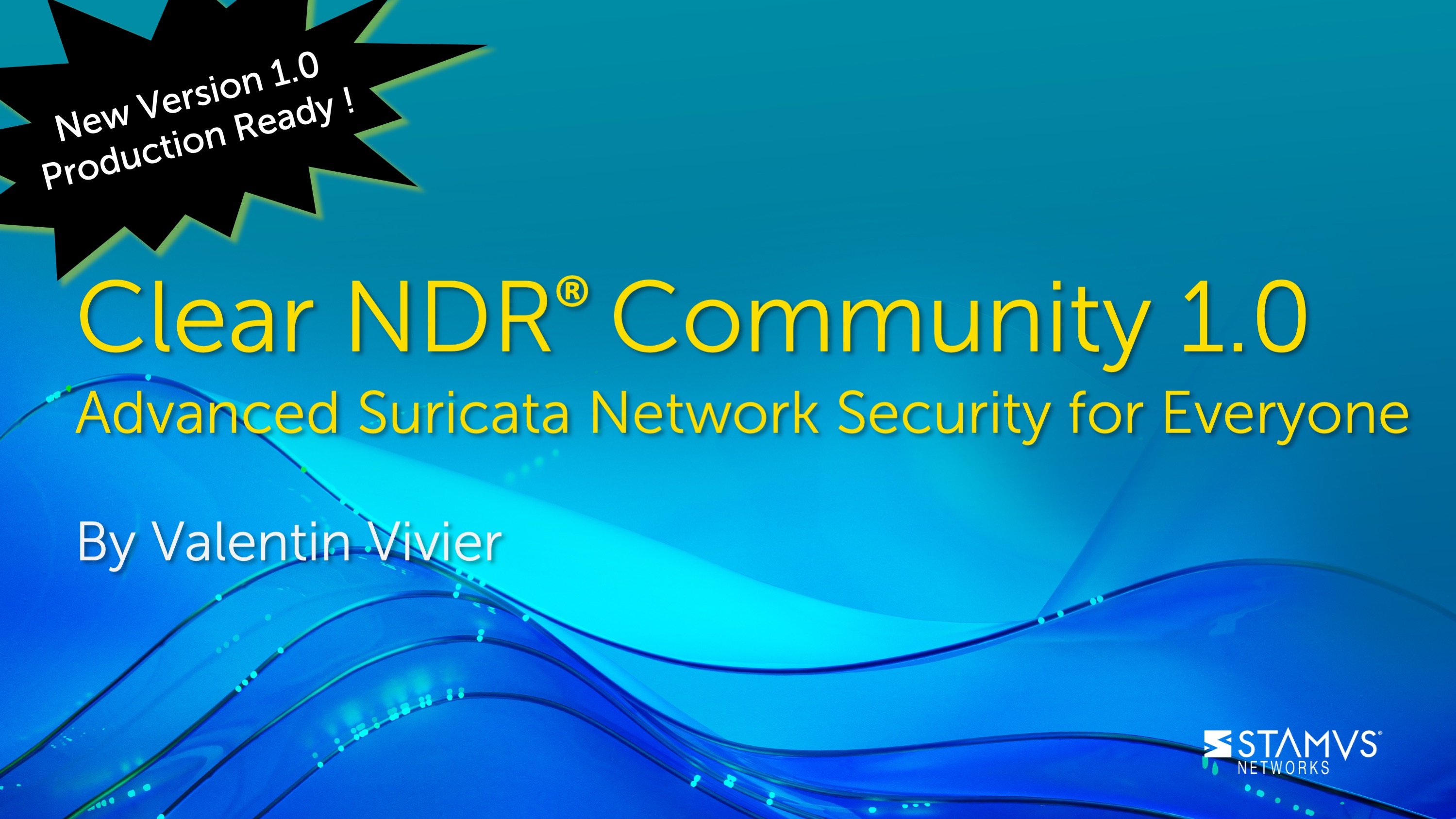This year SuriCon was a hybrid event for the first time ever. The conference was held both virtually and in-person at the Boston Marriott Copley Place in Massachusetts. The hybrid model might have not been new for the attendees and the presenters but it was definitely a challenge for the organizers. After a lot of hesitation (and a few minor nightmares), the Open Information Security Foundation (OISF) team managed to organize the event flawlessly and brought the Suricata community back together.
Stamus Networks was once again part of the event and we want to thank everybody that attended our talks and training. We also want to say “thank you” to the organizers, who did a wonderful job adapting to the challenges. I sat down with Dr. Kelley Misata, the Executive Director of OISF, who shared a behind-the-scenes look at what it took to make SuriCon 2021 a reality and gave us a preview of what we can expect from SuriCon 2022.
Learn more about getting more out of Suricata.
Check our interview with Dr. Kelley Misata here:
If you're interested in seeing "SuriCon 2021: Through the eyes of the Stamus Networks Team", please click it out here >> https://www.stamus-networks.com/blog/suricon-2021-stamus-networks-team-reflections
Transcript
Elis: I'm excited to be talking with the Executive Director of the Open Information Security Foundation - Dr. Kelley Misata. Welcome Kelley!
Kelley: Hello.
Elis: So for the next half an hour or so I would like to talk a little bit about SuriCon 2021 because as we know it was a big event for the OISF, so we're happy to hear how it went for you. So, firstly, something that was very interesting for me is to know how you imagined the event? Because as you were planning out SuriCon for sure you had some ideas in your mind how you want it to be but how did you imagine a successful event this year?
Kelley: Well I appreciate the sentiment that it was successful. You know myself and my team certainly agree with that. I have to say that it came with a lot of hesitation, it came with a lot of planning. I had sort of the decision up until the very last minute because we had so many wonderful SuriCons over the past six years, that it was hard to imagine the space where not only my team couldn't be there fully in-person and our community couldn't be there fully in-person. So it was really almost a heart-wrenching decision because 2020 was really difficult to make the hard stop, to say we weren't going to do SuriCon at all last year. So when the decision deadlines kept creeping up on me, I kept thinking, you know, it's very important for this community to come together. We needed to be able to connect, we needed to talk about Suricata, we needed to see what everybody else was doing. So putting together this hybrid event really was our only choice and, you know, I have to say looking back on it, it went off far better than I imagined.
My team is used to hearing me talk about my SuriCon nightmares that start usually about three months before SuriCon kicks off and this year's nightmares were pretty intense. So I think I had sort of processed in my head and in my dreams all the worst case scenarios and thankfully none of them happened, so it was fantastic. And it's really a tribute to my team, our community, our sponsors and to the amazing audiovisual crew that we had working with that site.
Elis: It's good to hear that everything went as planned or as planned as it could be. So you know it brings opportunities and it has some flaws from using the hybrid model but if you had to choose, would you choose to continue doing it even after the pandemic is over. Because it creates a lot of opportunities for people to join from across the world.
Kelley: Yeah. I think I think there will be some element of it you know for us, we live in a virtual space we've been a virtual company for 12 years and so managing in that context is not new for us the whole reason why Suricon was launched was to bring everybody away from their monitors away from that virtual space and bring them together so that we could be together as a community, right, in person have a beer have some great conversations. But you know the world shifted last year so I would imagine you know as we're thinking ahead to 2022 we are thinking about ways of doing it that honors our original intentions what Suricon was always meant to be and respect the fact that there might be some people who may not travel as much as they used to so we're trying to find that balance right now and giving it a lot of thought Suricon is a big lift for us and it's so important for our community and so important for Suricata.
Elis: Yeah, and because of the hybrid model this year that you used for sure there were some new things that were in the conference and in the sessions. So for example did you have any sessions that stood out for you, like making the hybrid experience something you weren't expecting?
Kelley: For example I wasn't expecting that all recorded talks would have gone off so well. So we did our speakers who could not join us in-person, record their talks ahead of time and did a live Q&A during the event and that handoff from the recorded part to the live Q&A was part of the stress for me. Like "Oh my goodness what if the speaker doesn't show up? What if their connection is bad?" like all those terrible whatevs and "what if the recording wasn't done well?" There wasn't a single talk that did not, you know, go perfectly.
We had all of our speakers do a phenomenal job of doing their recording, standing up and doing those recordings ahead of time and showing up the day of SuriCon, sometimes in the middle of the night, depending on the hours, sometimes in the middle of the night to do those live Q&As and our online community was asking questions on discord and our live community was asking questions live. And our presenters were there answering those questions and so it was the best of what we could get in that, you know, in the situation that we're in. But if I were, I don't think I can pinpoint one exact one but I would think you know all of those virtual talks and the live Q&As that followed were really … . I mean one of my teammates did a lightning talk and she was up till three in the morning to show up for her live Q&A, so I have to give a shout out to Shivani [Bhardwaj] on my team for being up so late every single night to join us at SuriCon.
Elis: Hopefully she sees this interview.
Kelley: I hope so. Yeah.
Elis: So none of your nightmares came true - that's good, but I saw that many of the sessions were focused on developer participation and I wanted to ask you, do you have any plans on creating educational pathways for non-developers or just end users?
Kelley: Absolutely. So what we do when we're planning SuriCon and you know and this year was again a little bit of a weird situation but we have personas that we've identified in our community that we really try and target. So we have users, we have academic users, we have researchers, we have developers, you know, we have this melting pot of amazing personas. When we're collecting or doing our call for talks we try and bring in folks from all of those different pockets, so that when we're planning the agenda there's something for everybody. And so, you know, we really do rely on the community to come bring your user use-cases, come talk about "being a user" experience, come do a poster if you're student. We have a poster session that they can come do.
We also offer scholarships for students, we also would love to hear from faculty about how they're teaching network security in the universities and how Suricata can weave into their curriculum. So we're trying to pull from all of these different angles within our community. I think I love the opportunity to give to everybody that wants to participate in this event even if it's a student. Or just the person that wants to participate, submit a talk, all the talks are reviewed by our team, and we really do want to make sure that we have all of those beautiful pieces together because the community isn't just who's developing Suricata today, it's who's using Suricata, who's developing, who's learning about it, to bring Suricata into the future
Elis: Yeah. I want to bring a little bit of your marketing side here because, as you know, I'm a part of the marketing team here at Stamus Networks and I noticed on your LinkedIn profile that as the Executive Director of the OISF some of your responsibilities include creating strategic plans, you know, for outreach and marketing. So something that you know is interesting for me is how do you promote this kind of event especially during a pandemic? How do you make sure that it reaches a lot of people?
Kelley: Well I think as anyone in marketing would admit, you know, there's always room for opportunity to improve and to do things better from our perspective. You know, we - as an open source project - we really do rely heavily on our community so the more that we offer up to our sponsors and other community members: "Here are ways that you can help us promote streak on" the better. And we really do try and hit all those different pockets, you know. The contributors who are contributing code to Suricata, our consortium members are great outreach channel for us we are making lots of strides through our training events and through our academic outreach. We also try to market SuriCon in different pockets where folks may not hear about us on a regular basis - so some of the groups that are involved with folks in security in the underserved sort of demographics. So we spend a lot of time with Women in Cybersecurity, we partner with an organization called Outreachy so we really just... and it takes the entire team, this is not a Kelley thing, this is an entire OISF.
Everybody tweets, everybody gets it out there, and it's really a collective effort on everybody's part. I'm sure that takes a lot of time and effort and, you know, everybody putting all they can to promote the event because it takes a lot of effort from the team. I'm very very lucky, you know, my team across the board, they are the type of people just naturally where they don't just sit in the job that they were hired for. They know when they come in and they do it with their whole hearts that they're going to jump into whatever tasks we need to do to advance SuriCon, to advance Suricata, to advance OISF. They just step up and do the work - whatever is needed - to be done. So you know there's a whole group that, you know, we stand shoulder to shoulder at OISF to make this all work
Elis: I have one last question for you: Because during the event I saw that some people hve shared on Twitter their conference badge and I was interested in how you came up with this idea?
Kelley: Oh, I have to give my daughters credit to be honest with you. Both my daughters are fierce around sustainable products and doing better for the environment and they have really influenced my thinking in that domain and so when we were thinking about SuriCon, you know, at in all the corners of the things that we bring in, you know, I thought "Where can we just do something a little bit different to kind of reduce the amount of waste". As much as I love my conference badge, it's a lot of plastic. Actually I have my badge here. So our badges for SuriCon, this was a test as you know, our badges are made out of materials that you can plant and it'll grow flowers. So there are seeds that are in the paper, well so the only waste if there's waist, is this and not a piece of plastic. So this can be planted and flowers will grow and this can be reused for next year, so that's our aim and it was a test I have to say.
Elis: And the whole idea came just from your kids? You know, not the idea but you thought about it because of your kids?
Kelley: Yeah, I wanted to find a way for every SuriCon going forward that we can do something that helps protect the environment, that sort of recognizes the fact that we have a lot of, you know, waste in our society across the globe. And so, you know, it's ... my kind of personal goal is to have one thing every year at SuriCon move us better in that direction. This year it was the badges and they got great reviews, so I was pleasantly surprised that everyone in the room was like "These are great let's do them again!"
Elis: So that's definitely something you're going to keep for SuriCon 2022.
Kelley: Yeah. Maybe not this brand, we might test out another brand but the whole concept for sure .
Elis: Do you have any plans for SuriCon 2022? Have you come up with any ideas that you want to share or it's too early to ask for this?
Kelley: We are working feverishly on all of our plans because it is always my dream to have the next SuriCon planned when we're at the current one. We are being really mindful about where things are going in the world and not wanting to make commitments that, you know, there might be a chance that things have to shift again. So we're trying to take a deep breath, we are going to be back in Europe, so that is for sure. We're pushing very hard to have our conference in November. October came up very quickly this year, so I'm trying to avoid doing it in October. And we will likely be putting the call for talks out by early February, so that's our current plan. We will definitely have plantable badges and our call for sponsors is of course open right now. So if anybody would like to join as a SuriCon sponsor, come on board. The sooner, the better and we'd love to!
Elis: How can people find out more? On social media?
Kelley: The best way to find us is through our Twitter. So Suricata IDS is a great place to find us. SuriCon is on Suricon.net, so check out our website. We have all the archives from past events there, pictures and our talks are there. So check that out but the best place to find us is Twitter and of course Suricata.io is our website. So we would love to answer any questions folks have about SuriCon, hopefully at least we will see you at SuriCon. Come here, come hang out with us, it's a lot of fun!
Elis: Okay. Thank you, Kelley. Thank you for your time, I wish you a lot of success with your future events and less nightmares! Thank you.
Kelley: Thank you so much!
Follow us on social media and keep track of the other events where you can join Stamus Networks:






